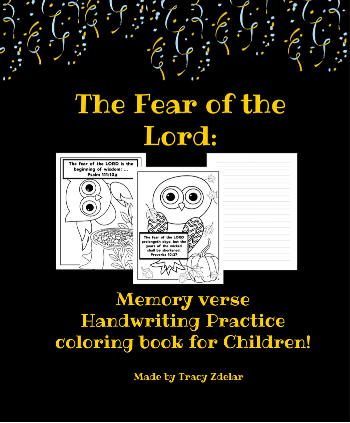*Last week’s post was getting too long so I split it into two…making this series officially 14 weeks out of 13 😉 Last week I shared a behind the scenes view of how Satan (the Devil) works to counterfeit God’s Word and confuse believers and those who would be. Today I will share a few examples of exactly how the Word of God has been changed in some, if not all, of the newer bible versions. This post might make more sense after you’ve read last week’s post {Part 1}. All scripture used in this post is KJV unless otherwise noted. I’d like you to grab your copy of the bible, whatever version it may be and follow along. And so we begin…

“Every word of God is pure: “… Proverbs 30:5
“For verily I say unto you, Till heaven and earth pass, one jot or one tittle shall in no wise pass from the law, till all be fulfilled.” Matthew 5:18
“The changes, additions and omissions discovered in the new versions have affected the health of the body of Christ and taken it step by step away from the image of God.” p. 5 New Age Bible Versions by G.A. Riplinger.
Change. It isn’t always good.
“Behold, the days come, saith the Lord GOD, that I will send a famine in the land, not a famine of bread, nor a thirst for water, but of hearing the words of the LORD:” Amos 8:11
“Now the Spirit speaketh expressly, that in the latter times some shall depart from the faith, giving heed to seducing spirits, and doctrines of devils;… I Timothy 4:1.
This seems to be happening before our eyes and yet it flies under the radar of many. There are over 400 bible versions and yet the Word of God is “disappearing”. By disappearing I mean its being changed and undermined. By the way, I’ll share examples from only a few versions but whatever version you hold, please look up the verses below and see how they line up. I think many of the versions share the same changes.
I suspect many people view these changes as just making the bible “easier to read”. But that isn’t the case. Did you know that the bible wasn’t written to be understood entirely by just a natural (unsaved) man/woman? I Corinthians 2:13 …“comparing spiritual things with spiritual.” vs. 14 “But the natural man receiveth not the things of the Spirit of God; for they are foolishness unto him: neither can he know them, because they are spiritually discerned.” There are things written in the bible that any one can understand, but then there are things in there that require the indwelling of the Holy Spirit within the believer in order to be understood.
Just a snippet of examples.
Got your bible? Let’s look at Hell. This word is mentioned…
- 54 times in the King James Version (KJV)
- 32 times in the New King James Version (NKJV)
- 14 times in the New International Version (NIV)
- 13 times in the New American Standard Bible (NASB)
- 13 times in the Revised Standard Version (RSV)
- 0 times in Young’s LITERAL Translation
I Timothy 3:16 “God was manifest in the flesh,…” (KJV)
NASB, NIV, New Century Version and The Message all change “God” to just “he”. The NLT and the Contemporary English versions change “God” to “Christ”.
I John 5:7 (KJV) “These three are one”. (Definitive verse about the Trinity). The six versions I mentioned above plus the NKJV do not say “these three are one”, the best they say is that they agree.
Colossians 1:14 (KJV) “In whom we have redemption through his blood, even the forgiveness of sins:” The NASB, New Century Version, Contemporary English Version, NIV, and The Message all leave out the part about Jesus redeeming us through His shed blood.
Ephesians 5:1 (KJV) “Be ye therefore followers of God, as dear children;” Some of the other versions?
- New Century Version says, “You are God’s children whom he loves, so try to be like him.”
- NASB says, “Therefore be imitators of God, as beloved children:”
- NIV says, “Be imitators of God, therefore, as dearly loved children…”
- NKJV says, “Therefore be imitators of God as dear children.”
- The Message says, “Watch what God does, and then you do it, like children who learn proper behavior from their parents.”
There are way more changes made than I can talk about in one post. But here are a few more key words I’d encourage you to compare with the KJV… “meekness” and Christians mentioned as “slaves” in the newer versions where the KJV calls us “servants”. Include reliable truthful definitions of these words as well. For example, being a “slave” indicates one doesn’t have a choice whereas, being a “servant” of Christ we do have a choice to obey or not obey. We are making such decisions every day of our life 😉
………………………………..
My personal experience.
I grew up on the KJV but didn’t understand what made that version so special. In my twenties I transferred to Liberty University, a Christian college in Virginia. There I switched to a NKJV study bible and became deeply interested in switching to one of the American Standard bibles. I was pretty clueless, and I’m thinking maybe some of my bible teachers were too.
Around the time of my going to college in VA, my home church was going through changes too. They realized what biblical discipleship meant and got serious about it. Several years later when I came back home I signed up for discipleship. Biblical discipleship is just one believer meeting with another believer walking them through the basics of Christ’s teachings so they can live an obedient life, glorifying to God, and leading others to Him as well. Its what Jesus told His disciples to do…”Go ye therefore, and teach all nations,… Teaching them to observe all things whatsoever I have commanded you:“… Matthew 28:19-20
I was paired up with Beth B. and using my NKJV. One day when we were meeting she told me to turn to I Timothy 6:10 and read it. My NKJV said “For the love of money is a root of all kinds of evil,…” The KJV says…”For the love of money is the root of all evil:…” Big difference there. {Remember jot and tittle?- if God cares about the smallest, then there has to be something wrong with this change.}
………………………………………………………….
Leaving verses out as if they don’t matter or can’t be trusted.
In Acts 8 an Ethiopian Eunuch is in his chariot reading Isaiah. Meanwhile, the Holy Spirit tells Philip to join himself to the chariot. Philip obeys and asks the Eunuch if he understands what he’s reading. The Eunuch replies, ” ‘How can I, except some man should guide me?’ And he desired Philip that he would come up and sit with him.” verse 31. Philip starts in Isaiah and tells him about Jesus. In verse 36 the Eunuch asks, “See, here is water; what doth hinder me to be baptized?” This is key. Baptism cannot save you. It is the first step of obedience after receiving Christ. Its a public display of what has already happened in your heart and we are commanded to do so. How does Philip answer him? Look up Acts 8 :37 in your bible. Here are a few versions…
- KJV: “And Philip said, “If you believe with all thine heart, thou mayest.” And he answered and said, “I believe that Jesus Christ is the Son of God.”
- NIV: Omits the entire verse and demotes it to footnote status.
- New Century Version (NCV): Omits and demotes to footnote status.
- Contemporary English Version: Says verses “36-37 As they were going along the road, they came to a place where there was some water. The official said, ‘Look! Here is some water. Why can’t I be baptized?”
- New Living Translation: Omits and demotes to footnote status.
- The Message: Omits.
- NASB: Leaves doubt in your mind that it is the word of God because it puts brackets around the verse and footnotes the following: “8:37 Early mss do not contain this v” meaning early manuscripts do not contain this verse.
There really is more to know but this will have to be enough for this post. I hope you will take some time to determine why you use the version you use. God’s Word should be our final authority. Do you trust the version you hold in your hands to be THAT version that God has preserved? His pure word?
For me, its the Authorized King James Version of 1611.
This is the end of this summer series. I blog about a lot more than just my faith. If you’d like to tag along you can subscribe here. I hope you will 😉
*Want to read the other posts in this series? This link will take you there.
…………………………………………………………………………..
*This post is also linked up with WorksForMeWednesdays.









tracy, i’m going to respectfully disagree. there are hundreds (thousands?) of early manuscripts that scholars can look at today and translate today. you are right that not all version are equal, but scholarship has improved considerably since 1611 and many ancient manuscripts have been discovered since to help improve translation of scripture.
some bible versions intend to be more user-friendly or readable, and some do not seek to be literal translations as much as paraphrases–both which have a place, in my mind–but the general consensus of scholars is that the New Revised Standard Version is truest to original manuscripts.
the NRSV does have more gender inclusive language–which many will argues is a good thing–but footnotes do mark where any adjustments have been made (“brothers and sisters” from “brothers”.)
translating language isn’t a science. there are good and worthwhile things about many versions and translations–most which are carefully, prayerfully compiled and agreed on by large bodies of learned, godly men and women and christian organizations. much can be gained by reading several versions side by side.
at the end of the day, none of us reads alone. the Holy Spirit reads with us and reveals the Word of God–no matter the translation–encouraging, convicting, blessing, interceding and drawing readers to the very throne of God. how incredible!
grace and peace
Thank you, Katy 😉
Thank you, Victoria 😉
Suz,
Regarding the ESV: I was checking out the translators and the manuscripts a bit over at that link you shared. I am actually reading now about manuscripts and based on G.A. Riplinger’s research/documentation there are 2 different Greek Texts used to translate bibles. One used for the KJV that has way more historical support/Greek reliability (I’ll have to go into this more) and the other which is the changed-corrupt Greek that newer versions came from prior to 1993.
The ESV website says they used a variety of sources including a different Greek text which leads me to think they have probably combined this faulty Greek text in with all the “good” they’ve used. If this is the case, I would not trust it. How will you know what’s actually God’s Word from the reliable and common Greek text used and verified prior to the KJV and what is the “changed” Greek text used in “newer” versions – which has been blasted for its disease?
This is not the best I can do for an answer, but its the best I can do for right now. I really recommend you don’t take my word for it but get a copy of G.A. Riplinger’s “New Age Bible Versions” and see all the research this author has put into investigating these things. The author spent 6 yrs investigating these things.
You can also subscribe to my blog’s email updates (or RSS) just in case I do a post on any of this after I’m done reading more on it.
What a great post. My husband is a pastor and he was just discussing this with someone the other day. You are so well-spoken (well-written) and you are right that it is something we could all use in defense. My husband likes to joke that we use King James because it is what Paul used…. corny, I know. Can’t wait to read past and future posts. God bless you sister!
I’d be interested to see what you think of the ESV translation. I had never heard of it until very recently and I really love it. It is a translation taken straight from the Greek and Hebrew but uses a lot of the KJV (not the NKJV) as a resource.
Read more about it here: http://www.esv.org/about/intro
It’s in response to critcism of the NIV and the NAS versions.
Megan- no problem at all! Asking questions is how we learn 😉
First, *whew! there is so much more that could have been said on the subject that I had to cut it off somewhere. And some of what I “know” I haven’t researched enough to go into detail yet. But here are some points that I consider when choosing to back up my stand on the KJV over other versions…
1- All the newer versions, if I’m not mistaken, have been written AFTER the KJV.I think they started in the 1880’s.
2- As I’ve been told, the KJV was actually transliterated from Greek texts that come through the “lineage” of the first church in Antioch mentioned in the bible. There are no “original” manuscripts since early Christians were being persecuted,running for their lives and taking the Word with them. They would have had to copy it down and share it. Those “originals” would have been used to bits and no longer exist.
3- Likewise, the newer versions have come from “known” faulty/ incorrect Greek texts…again, as I’ve been told. I need to do more research. You might look up the man named Origen and see what he may have to do with this and a school in Alexandria, Egypt.
4- Two things that are different are not the same. The Word of God has clearly been changed. Someone is wrong? Which version is wrong? If God said he would preserve his Word and we know that faith cometh by hearing and hearing by the word of God…God certainly will keep his Word on this. What is more important?
5- The bible says (and I’ll have to look up the exact verse)that the Word of God will not be bound. The KJV is the ONLY bible version not under copyright, as I’ve been told…that doesn’t mean publisher copyrights as they can add their own touch to the bible (references, footnotes, studies, maps, etc).
6- Transliterating the KJV was no simple process…this too would take a post or more to cover 😉
7- Here’s one that will blow you away… I have been reading “New Age Bible Versions” by G.A. Riplinger and it contains examples of how much the newer versions line up with Satanic teachings…word for word. I highly recommend all bible believers to read this book.
Maybe I’ll do a series on “Why the KJV?” eventually because I could use the practice in defending this very important topic! I suspect this has given you plenty to look up on your own too. Thank you for asking, I hope this helps 😉
This is a great post. I personally use the NIV version, so I slightly disagree, but I definitely appreciated reading your research. The only thing I’m wondering about is whether you can be sure that the KJV version is the one that is closest to the Greek/Hebrew? I recognize that there are slight differences in all the versions, but I guess I’m not sure how you know that it’s the KJV that should be the comparison of the others. How do you know that another one isn’t actually more accurate? I’m not trying to be argumentative, I’m honestly just curious and trying to learn 🙂
This is great! Thanks for the research!